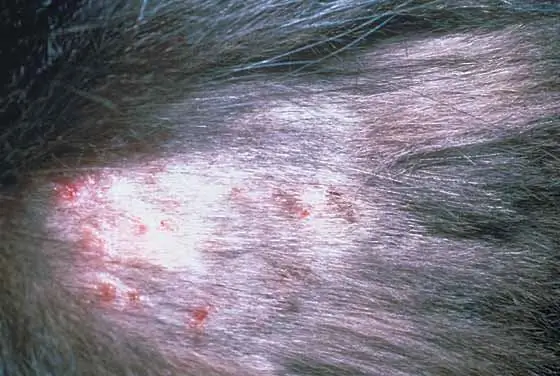2026 Author: Priscilla Miln | miln@babymagazinclub.com. Last modified: 2025-01-22 17:55:13
Massage procedures bring great he alth benefits. They help relieve pain, calm the nervous system and strengthen muscles and joints. This type of therapy is necessary not only for people. Massage for dogs is used in the treatment of injuries, diseases, as well as for preventive purposes. These days, many veterinary clinics offer this service. However, each dog owner can master the massage technique on their own and do the procedures for the pet at home.
Benefit
For the first time in their lives, dogs are introduced to massage at an early age. When a mother licks her newborn puppies, she helps them breathe. When the cubs grow up, the mother kneads their tummies. This manipulation prevents constipation.
Massage for dogs is necessary in adulthood. This is a good remedy for the treatment and prevention of diseases. The benefits of massage treatments are as follows:
- Massaging movements stimulatecirculation. As a result, blood rushes to a certain area of the body, tissue nutrition and local metabolism improve. This contributes to faster healing of injuries, so massage is often prescribed for injuries.
- The procedure stimulates motor nerves. Therefore, massage is necessary for paralysis and weakness of the muscles of the paws. This rehabilitation event helps restore movement.
- Massage helps to relax and calm the nervous system. It is useful to do this procedure for a dog after experienced stress, difficult training or exhibition.
- Massage treatments improve peristalsis and promote easy bowel movements.
In many cases, dog massage can be done on your own. However, if your pet is seriously ill, then the procedure should be handled by a professional. Not all massage treatments can be done at home.

Indications
For what diseases is massage for dogs indicated? This procedure is effective for the following pathologies:
- diseases of the musculoskeletal system;
- injuries;
- constipation;
- inflammation and degeneration of the joints;
- pain syndrome of various origins;
- neurotic disorders.
Massage should be done regularly even for he althy dogs. This will help your pet maintain a he althy musculoskeletal system well into old age, as well as relieve stress and relax.
Contraindications
There are times when massage is contraindicated. Thisthe procedure should not be done under the following conditions:
- fever;
- any damage and skin lesions (eczema, tumors, wounds, pustules);
- bleeding;
- fresh bone injuries with severe pain;
- epilepsy;
- severe diseases of the liver and kidneys;
- shocked.
If the dog has at least one of the listed contraindications, then refuse the massage. Otherwise, the medical procedure will do more harm than good.

A few tips
Before massaging your dog, read the following tips from veterinarians:
- You will need a basic knowledge of dog anatomy and physiology. You can find out about the characteristics of the body of animals from a veterinarian. You can also find this information yourself on dog breeding websites.
- During the procedure, turn the pet over to massage first one side and then the other. Try not to press on the stomach, this part of the body can only be lightly stroked. Otherwise, the abdominal organs may be damaged.
- If your pet is diagnosed with a serious illness, then it is better to entrust massage procedures to a specialist.
- If you are doing preventive massage to a he althy dog, then the procedures should be regular. Try to do this for at least 10 minutes every day. This will be a good prevention of the development of arthritis.
- If your pet is he althy, then pay attention to his reaction to the procedure. If the dog shows displeasure (growls,flinches), then don't force her. It is necessary to accustom the animal to massage gradually.
Making a general massage
Veterinarians recommend general massage to prevent disease. The methodology for its implementation is as follows:
- Cover a hard surface with a soft cloth. Place your pet on it and stroke from head to back.
- Massage the back first with your fingers and then with your palms. Gently knead the skin, being careful not to put pressure on the spinal column.
- Focus on the sacrum. Massaging this area prevents joint diseases.
- Rub your paws from top to bottom. Then bend and straighten each finger.
- Gently stroke your pet's belly. When doing this, avoid sudden pressure.
- Now move on to massage the muzzle. Grab the cheeks with your fingers. Lift them up and then down. Stroke the chin, as well as the area around the nose and eyes.
Finish with stroking the ponytail from base to tip.

Relieve pain
How to give a massage to a dog if something hurts the pet? The procedure technique is as follows:
- Lay the dog on a blanket or on the floor, petting and talking to the dog in a soft voice.
- Rub your shoulders, neck and back in a circular motion as if you were kneading dough. Do not press hard on the body, this may increase the pain.
- Knead your paw muscles gently. Move from their base down. Don't forget to massage your fingers.
- Direct impact on the focus of pain is prohibited. You can only stroke and knead the muscles around the sore spot. This will help improve circulation and reduce discomfort. Be especially careful if the dog suffers from oncological pathologies. Try not to touch the neoplasms, this can provoke their growth.
- Finish with light stroking of the entire torso from head to tail and each paw.

Help your dog relax
Relaxing massage for dogs is essential for calming the nervous system and relieving stress. This procedure is useful to do when your pet is scared of something or after a hard day. In this case, the main attention should be paid to the head, ears and back.
Follow the following sequence:
- Stroke your pet's entire body. At the same time, try to talk affectionately with the dog. Rub the dog's neck. This will help the animal calm down and relax.
- Start the massage from the neck. Massage this area in downward circular motions. Do not press too hard, remember that there are many vessels in this area. Massage the ears and the area around them, but very gently.
- Then move on to the shoulder girdle. Do the same circular motion. Gradually move towards the tail.
This completes the procedure. You can finally stretch the ponytail a little or turn it three times in different directions. But watch your pet's reaction. Some dogs are such manipulationrelax, but not all dogs like touching the tail.

Massage the limbs
Massage of the hind legs in dogs is done with paralysis and weakness of the muscles of the limbs. This procedure is an important part of rehabilitation. It stimulates nerve endings and develops muscles. This contributes to the restoration of normal limb mobility.
To achieve the desired effect, the dog's paws should be massaged regularly. Treatment should continue for at least 20 minutes a day. About 20 procedures are required to achieve the result. Then they take a break for 14 days and repeat the sessions.

How to massage a dog's paws? It is necessary to give preference to kneading and vibration effects. It promotes stimulation and recovery of nerves and muscles.
Use the following massage technique:
- Pet the entire torso of the dog. Try not to take your hands off while doing this. Your pet should be completely relaxed and calm.
- Gently stroke the paw. Move from its base to the heels. Then slowly bend and straighten the limb. Repeat this movement 5 times.
- Massage the paw in a circular motion. First move to the inner surface of the limb, and then to the outer. Repeat massage movements three times.
- Rub your leg muscles well. Gradually increase the intensity of exposure, but do not overdo it. Gently massage your heels and between your toes.
After one massagepaws, go to another. Using this technique, you can massage both the hind and forelimbs. If you repeat the sessions regularly, then the paws will regain strength. Gradually, your pet will learn to walk again.
Recommended:
Food for dogs of large and small breeds. Complete nutrition for dogs. Meat for dogs

In order for a beautiful he althy dog to grow out of a small puppy, you need to choose the right, well-balanced diet for him. After reading today's article, you will learn how to feed a shepherd dog and what to give a miniature lapdog
Fish diseases: treatment and prevention. Diseases of aquarium fish

Fish diseases can be caused by a variety of factors, including: improper housing conditions (in the case of aquarium fish), infections transmitted from other fish, and also caused by single- or multi-celled parasites
Skin diseases in cats: a list of diseases, a description with a photo, causes and methods of treatment

The skin of pets is regularly exposed to various negative influences, they are bitten by fleas, ticks and various blood-sucking parasites. As a result of this, various skin diseases in cats, as well as problems with coat, can occur. It is very important to accurately diagnose and treat. This will prevent the occurrence of dangerous complications
York diseases: description of the most common diseases, treatment, prevention

Yorkie are not he althy enough. They get sick often. Many of the ailments are due to their small size. For example, it is traumatism of representatives. An animal usually gets injured due to human negligence. It is because of this that Yorkies are not suitable for all children. Also, these dogs often suffer from allergies and colds
Pigeons, their diseases and treatment. Pigeon diseases dangerous to humans

This article talks about the most common diseases of pigeons, many of which pose a serious danger to humans

